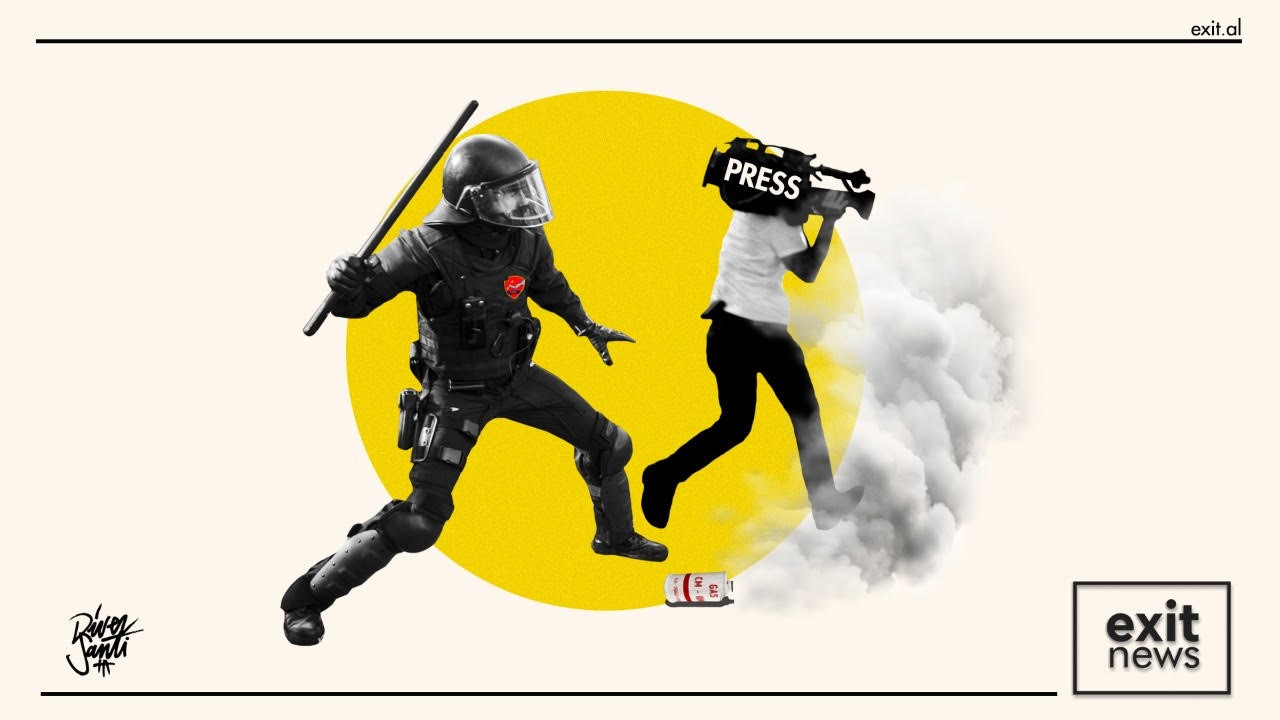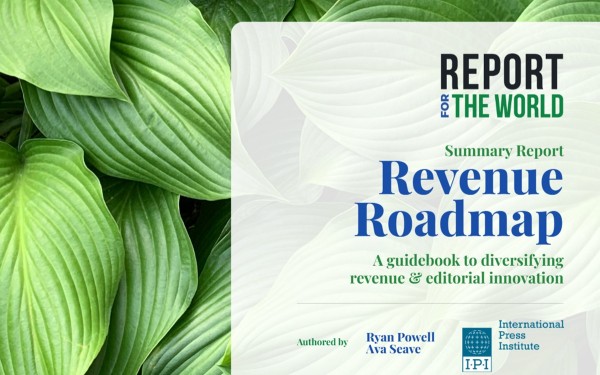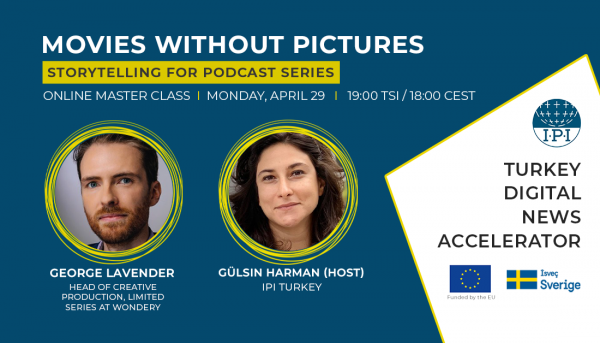IPI is proud to welcome the Albanian news portal Exit, together with Exit editors Alice Taylor, Bledar Qalliu and Neritan Sejamini, as new members of its global network. Exit was started in 2015 as a blog site by lecturers at the University of Tirana in social and political sciences. It was created as a way of continuing discussions and exploring ideas outside of the auditorium. Lecturers and students could publish opinion pieces, commentaries and analysis on social and political issues in the country. Over time, it became one of the first explanatory journalism portals in Albania. IPI recently spoke with co-editor Alice Taylor to learn more about Exit’s work and the situation of press freedom in Albania.
IPI: How did you get involved with Exit?
AT: I was working for a law firm in Malta, as the head of marketing. I wrote legal articles that we submitted to the local newspaper. Then, they asked me if I want to write for them. Eventually, I was successful and got my own column at a national paper. Daphne Caruana Galizia was also writing a column for the same page and this was a huge achievement for me. I’d been following her for years and thought she was amazing. She was so articulate, clever and fearless, and she was the main driving force of why I decided to become a journalist, and why I continued to pursue it.
When I came to Albania, I started a blog about life in the country, targeted at expats, which became really popular. Exit contacted me and asked whether I want to write for them. After what happened to Daphne, I said I’m not going to write about politics but eventually I did and now I’m co-editor.
I love the people I work with, I adore Albania, I feel at home and never want to leave. I have a daughter and I want to be a small part of making Albania a better place. Moreover, I am motivated by what happened to Daphne. I think women journalists work very hard to be fearless and to stand up to harassment and pressures from all sides.
IPI: What are Exit’s aims?
AT: Exit’s mission is to go beyond the story, provide context, explain why things happen, and cover the stories that many media portals won’t report on. Hence the name Exit. They wanted to do something different than what was already being done, like an exit from the standard narrative in the media.
By now we are eight people, and we have two websites, one in Albanian and one in English with four people on each site. Most of us all of us have other jobs as well to support us in our work. For instance, I have a background in law and do legal writing analysis. The rest of the funding comes from applying for grants. I spend one day a week looking for funding opportunities and asking people for financial support.

Despite the difficult situation, the upside of Exit is that we have the freedom to write about what we want. Because of this, it becomes like a passion project. I know that sounds cliché, but we are like a family. We don’t work here because we want to get rich, but because we believe in what Exit does and what it needs to do.
Since the 2019 earthquake and then the pandemic a few months later, the English page about Albania has also become the leading source of information for foreigners living in Albania.
IPI: What have Exit’s biggest successes been so far?
AT: By now we had several bigger stories. We uncovered that the government hired a company based in Germany to take content off social media that was critical of the government. This story went international and got picked up by German and Danish media. We also did a cross-border investigation with a portal in Malta and one in North Macedonia, covering a company that stole hundreds of millions from taxpayers through government contracts. Since we published our report on it, it seems to have stopped. Also, we revealed that the prime minister of Albania was planning on selling Albanian citizenship through a very corrupt company. I got my hands on a video of him at a private event, giving a speech to announce that he was going to sell passports and joking about communism.
IPI: What is your personal experience with press freedom in Albania?
AT: I was attacked by the government myself. In 2019 they made my life a living misery for quite a while. They claimed that I was a Russian spy and took away my residence approval when I was six months pregnant. I ended up hospitalized because of the stress and I nearly lost my baby due to the physical effects of anxiety, high blood pressure, and irregular heartbeat, caused by the targeted smear campaign. By attacking me as a foreigner, they made me understand what Albanians have to go through. I thought if I kept my mouth shut and put up with it, they would win. So, I decided to write more, to be more critical, to cover more controversial stories.
IPI: How would you describe the current situation for independent journalism in Albania?
AT: The main threat to press freedom in Albania is political pressure. Most of the media in Albania is owned by the same four or five families. These people are not journalists. They are construction magnates, oligarchs and businessmen. The media houses they have is just a part of their empire that they use to benefit their business. The journalists who work there are very much constrained by the editorial line of the owner, who often doesn’t want to cover sensitive stories.
There are some great independent media portals, but they are struggling with funding and not succumbing to external pressures. Many journalists do not want to put their name on articles for fear of reprisals for them and their families. Then there’s also financial and economic insecurity, including low salaries, which are sometimes even withheld for months at a time, often leading to self-censorship.
The other problem is informality in the sector. Many journalists do not have a contract, and when they do, it is often violated. Very few will be empowered enough to pursue it legally for fear of being blacklisted from working in the media.
Then we have another threat which stands completely on its own, and that is the prime minister, Edi Rama. He publicly insults journalists and uses the most disgusting language on television to talk about the media. This includes slurs like human rights abusers, illiterate, idiots, prostitutes, trash, and dogs.
He wanted to introduce a media law in 2018 that would put all online portals under the direct control of the government. It would give a government-appointed body the power to block, shut down, punish, and censor any media platform that breaches the rules. This body would be elected by the government and operate completely independently of the courts.
As a response to this, the Albania Media Council, with the help of the Council of Europe, UNESCO and the European Union, created the Alliance for Media Ethics, which is a group with about 20 to 30 media outlets. Now, if anyone is on our website and they have a complaint about something we’ve written, because they say it’s defamatory or not factual, they can file a complaint directly to the board of the ethical media alliance who will then review it. To the media houses that have become part of this organisation, the decision of the board is binding, and they have to abide by it. It’s the beginning of a very long process into improving the media environment here but I think it’s an important step that’s been taken.
IPI: What is the prevailing stance on journalism in Albanian society?
AT: People have a great distrust of journalists. This is due to the rhetoric but also due to a lack of professionalism. There are many issues such as fake news, copy and pasting articles, not sourcing articles, people running smear campaigns, writing news for political gain, propaganda, and so on. There’s also a complete lack of media literacy. We as journalists have to fight not only fight against the pressure of the government and business, etc., but also to fight to earn the trust of our readers. Albania in its current state, after the fall of communism, is 30 years old and it will take a long time for the media environment to mature and find its way to recovery.
IPI: How did the pandemic affect this situation?
AT: One main issue was the lack of information. Everything was communicated via the prime minister’s Facebook page. Information requests are very seldom answered. During the pandemic, it became even harder. Also, it became more difficult for journalists who were already working inside a very precarious economic situation. A lot of portals lost advertising revenue and found it very difficult to survive financially. People were losing their jobs or working on reduced salaries.
Experiencing the earthquake in November 2019 and then the pandemic just three-and-a-half months later had a huge impact on journalists in Albania. A lot of us were suffering from trauma in some form, from reporting on the earthquake, which killed around 51 people and devastated entire neighbourhoods. Then we were hit with the pandemic, which was pretty scary at first. No one knew what was happening, we were worried about our health and the safety of our families. It did have a big impact on people’s mental health. We were under so much pressure, not from our owners, but from the situation, to report accurately and to keep up-to-date.
IPI: What is your motivation for joining the IPI global network?
AT: I’ve been in contact with IPI for three years now. They were a huge support to me when I had my problems with the government and was attacked. Even just a supportive tweet from them was monumental to me at that time. I was terrified, I couldn’t leave the house and it was just a horrific experience for me. I had to close a lot of my social media because I was being threatened and harassed. To have that support was invaluable. Albanian journalists often feel like people outside of Albania don’t care about them, which is not true.
That is the reason why I like the IPI. I enjoy the advocacy work they do and also feel great gratitude for how they helped me when I had my problems. Being part of this organization allows us to network with people all over the world who share the same values and who make really valuable contributions. For us as an organization, it helps our development and strengthens our commitment to media freedom.
Alice Taylor is a British investigative journalist based in Albania. She is co-editor of the news portal Exit and board member of the Albanian Alliance for Media Ethics. She and Exit recently joined the IPI global network as new members.



